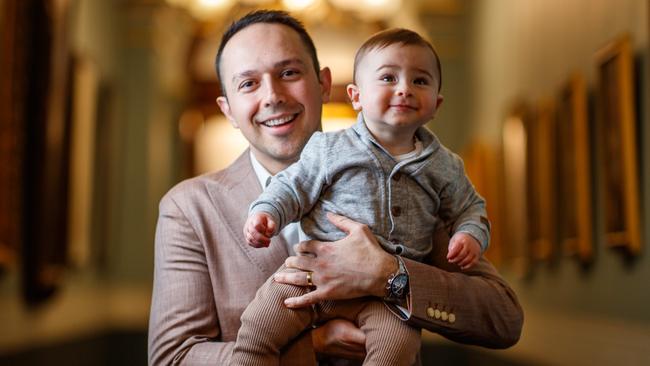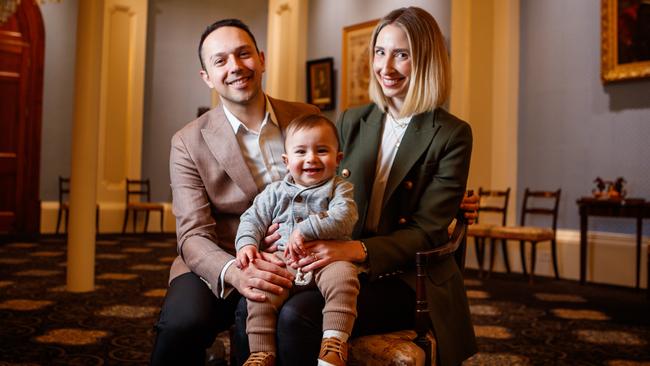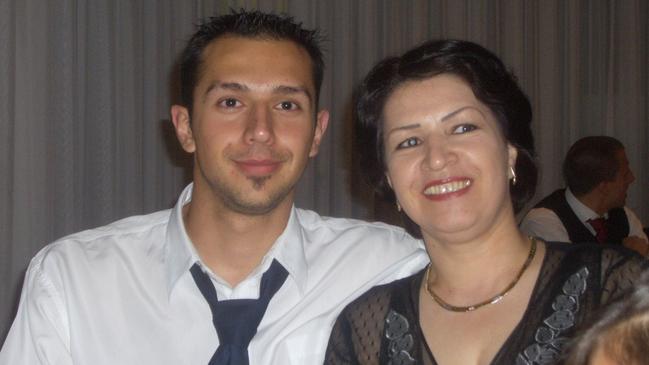Arman Abrahimzadeh is considering visiting his father in jail, 11 years after Adelaide Convention Centre murder
Why Arman Abrahimzadeh, whose father killed his mother at Adelaide Convention Centre in 2010, has never visited his dad in jail, but is considering doing so now.
SA Weekend
Don't miss out on the headlines from SA Weekend. Followed categories will be added to My News.
ON the night his mother was murdered, Arman Abrahimzadeh was desperate to confront the man responsible - his father.
But it is only now, more than 11 years later, that he is considering visiting the convicted murderer in prison for the first time.
Mr Abrahimzadeh has opened up about his plans as part of an investigation published in today’s SA Weekend magazine into what drives abusive men to harm their families.
Ziaollah Abrahimzadeh fatally stabbed his estranged wife Zahra in front of hundreds of witnesses at the Adelaide Convention Centre in March, 2010.
It followed two decades of abuse by a controlling and violent man who also harmed Arman and his sisters Atena and Anita.
They have not seen their father since court proceedings finished in 2012.
“From day dot he’s always found a way to shift the blame,” Mr Abrahimzadeh said.
“Part of the reason I want to go and see him is to find out for myself whether there is any remorse, any accountability.
“There’s the question that I’ve always wanted to ask, which is why? But this is not just about committing a murder. I want him to understand what we went through, that we didn’t feel safe in our family home, that we were isolated because of his actions.”
Ziaollah, who is serving a 26-year non-parole period, has written many letters to his children from jail - including one in which he claimed to also be “a victim of what happened” - and conscripted family members from as far away as Iran and Germany to phone them on his behalf.

But the last time Mr Abrahimzadeh spoke to his father outside of a courtroom was a few days before his mother’s murder.
“He said ‘I’m still your Dad and what’s happened in this family situation is wrong’,” Mr Abrahimzadeh recalled.
“But he was referring to us fleeing the family home (not his behaviour). I want to see if he has had time to reflect on his own actions.”
When asked how he felt about confronting the man who warped his childhood and took away his mother, Mr Abrahimzadeh conceded anger was still one of the first emotions.
“I sometimes wonder whether, if I see him in the same room again, will I want to be violent towards him?” he said.
“I don’t know until I’m there. If I see him cry, what will I do? If I see him smile, what will I do? On the night of the (murder) ... the first thing I wanted to do was see my Dad but a detective held me back. Eleven years later the urge to go and see him is still there.”
ENDING THE CYCLE OF ABUSE
His father was a controlling, violent man. So was his father before him. But Arman Abrahimzadeh has managed to break that cycle and, as a new dad, he’s determined to show his young son a better way.
It has been more than 11 years since Abrahimzadeh received the chilling news that his father had murdered his mother, following two decades of torment in the family home.
Now, the 33-year-old is considering visiting his dad in prison for the first time to ask: Is he remorseful? Does he take responsibility? Has he changed at all?
Abrahimzadeh has opened up about this complex relationship as part of an SAWeekend investigation into why so many Australian men are using violence against their families – and whether they can change.
In a rare insight, three Adelaide fathers admit the ways they have beaten, berated and controlled their partners and explain how specialist counselling has helped them to understand – and begin to change – their behaviour.

It is a slow process and evidence is still building as to how effective men’s behaviour change programs are in curbing a domestic violence epidemic which is ending the life of at least one Australian woman a week. But those on the frontline working with abusive men say it makes a difference and more funding is desperately needed to respond to the growing number who are putting their hand up for help to change.
Arman Abrahimzadeh was about 12 or 13 years old when he got in the car one day to go for a drive with his father Ziaollah.
“He had noticed that I was starting to be interested in girls and so rather than have the birds and the bees sort of talk ... he used that drive to essentially tell me how things are supposed to be run in a family home,” Abrahimzadeh recalls.
“He said ‘After me you’re the man of the house and you should be keeping an eye on your mum and your sisters. If they were to misbehave that’s a reflection on you and that means you’re not a true, proper man that can take control of your family’. My brain was like a sponge at that age so, of course, I absorbed some of that information.”
These life lessons were coming from a man who regularly imposed physical, emotional, psychological and financial abuse on his wife Zahra and their children, Arman, Atena and Anita.
After two decades of this treatment, Zahra gained the courage to leave the relationship and seek protection. But it was not enough to prevent Ziaollah from murdering her in front of hundreds of people at an Adelaide Convention Centre event in March, 2010.
“I learned what not to do from my dad,” says Abrahimzadeh, whose son Raphael turned one this month.
“I never felt comfortable talking to him about anything, or he would shut me off. Now I want to make sure that Raphael feels comfortable to talk to me about anything, any time. I’m mindful of the fact that, by default, I will be his role model, that he will look up to me.”
Abrahimzadeh says he has been told stories about how his father’s father was “a violent and abusive man too”.

“My father saw that and mimicked it. He didn’t have anything to compare it to.”
Seeing a better example was a key part of being able to break that generational cycle for a teenage Abrahimzadeh.
“I went to a friend’s house for dinner and at the end of the meal my friend’s dad got up and started to clear the table. My 13-year-old brain went ‘that’s not a man’s job’,” he recalls.
“Then the dad came over to my friend’s mum, gave her a kiss on the cheek and said ‘thank you for the meal’. I had never seen that affection in my home. My dad never did that. I went to other friends’ houses and saw similar stuff happening there and I started to think either there’s something wrong with these families or there’s something wrong in my family home.”
However, Abrahimzadeh acknowledges that he was affected by his father’s tactics and has had to work to undo his early influence.
In his late teens he entered his “first proper serious relationship”, which lasted about 18 months. “Once that relationship broke down I reflected and realised that I actually had been manipulative ... controlling to a degree,” Abrahimzadeh concedes.
“I thought long and hard ... and I kind of realised that maybe I was the one who was the problem.”
Since then, Abrahimzadeh says his best response to his father’s toxic example has been to create a different life.
The Adelaide City councillor is currently on six months’ parental leave from his job at the SA Housing Authority to be the primary carer for Raphael, after wife Genevieve Lewis returned to work.
Abrahimzadeh and his sisters also established Zahra Foundation Australia in 2015 to help women “in the situation that mum went through”.
“I haven’t grown up to be the man that he wanted me to be,” he says.





